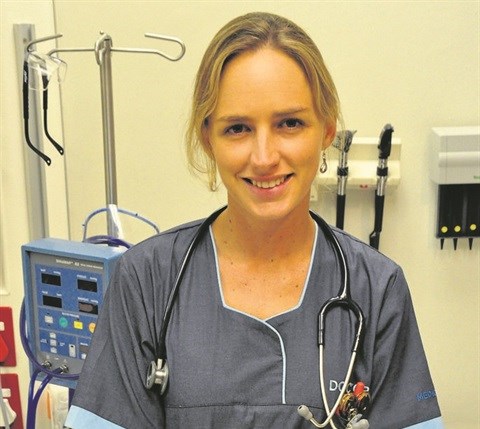She contracted multi-drug-resistant TB (MDR TB), basically a strain of tuberculosis that is difficult to cure because it does not respond to most conventional treatments. The drugs themselves made von Delft desperately ill to the extent that she started to go deaf.
Multi-drug resistance is a condition where the micro-organisms, such as bacteria and viruses, that cause an illness have learned to outsmart the antibiotics used to treat them, mainly because the latter are being overprescribed. They develop into so-called superbugs.
Thanks to an experimental treatment - she recovered, and as a result founded TB Proof to campaign for protecting healthcare workers against such occupational hazards.

Dalene von Delft: I wanted to comfort those suffering for ill health. I longed to put a smile on their faces.
Von Delft: On Christmas Eve of 2010, I got the bad news that I had contracted occupational MDR TB. Healthcare workers in South Africa are six times more likely than the general population to contract drug-resistant TB because of exposure in the workplace.
Von Delft: What followed was 19 months of treatment, during which I had to make some potentially life-threatening decisions in an attempt to preserve my hearing and career.
I had optimal access to all forms of care, including the use of the first new TB drug in 42 years, bedaquiline, on South Africa's short-lived 2011 compassionate use programme. I consider myself extremely fortunate to have recovered so well from this debilitating disease, but the vast majority of other DR TB patients are not nearly as lucky.
Von Delft: I have subsequently become a very motivated TB patient/physician advocate, campaigning for more effective, safer and equitable treatment options. I am a founding member of TB Proof, an education and awareness community seeking to destigmatise all forms of TB and empower healthcare workers and students to protect themselves and their patients more effectively against nosocomial TB transmission.
My advocacy work involves various national and international platforms, including being a member of the WHO's (World Health Organisation) Strategic and Technical Advisory Group for TB (STAG TB) as well as the Global Drug-Resistant TB Initiative Core Group (STOP TB Partnership).
Von Delft: In 2013, TB Proof was awarded the Center for Global Health and Diplomacy Award in recognition for Distinguished Work in the Field of Global Health.
I was also selected as one of the "Mail & Guardian" 200 Young South African Leaders in the same year, and received the Global Public Health Young Achiever Award - in recognition of Outstanding Contributions towards Global TB Control Efforts at the India International Public Health Conference in 2014.
Von Delft: There needs to be updated, standardised TB infection prevention and control policies (IPC) at all healthcare facilities, including training institutions. All people accessing these facilities should be covered, including workers, students, patients, volunteers and visitors, in line with International Labour Organisation workplace standards.
These policies need to be adhered to by infection control officers and/or committees tasked with implementation, which includes training and recruiting more occupational health practitioners and possibly the pooling of IPC, occupational health and quality assurance teams.
In terms of education, healthcare workers must know why IPC is critically important with an emphasis on rapid risk identification and reduction.
Monitoring and evaluation is critical and there must be documentation of IPC compliance as well as mandatory notification of all occupational TB cases in line with WHO requirements.
Workers also need to be educated about their rights and the COIDA (Compensation for Occupational Injuries and Disease Act) claims process streamlined to dramatically improve approval times. Workers eligible for compensation should include all those performing a facility- or community-based service which puts them at risk of TB exposure, including those without formal remuneration and/or employment contracts, such as students, volunteers and supernumerary healthcare workers.
Von Delft: Never forget that TB is a curable disease. We have TB Proof members that are XDR (extensively drug-resistant) TB survivors. Although it is difficult to complete treatment, if you stick to it you can get cured and live a normal healthy life again. Never be scared to test for TB - the earlier you get diagnosed, the better your outcome will be.
Von Delft: Working in the garden - especially pulling out the weeds, reading novels on rainy days and spending time with family and friends.
To find out more about the advocacy work Von Delft and her colleagues do, go to www.tbproof.org.
